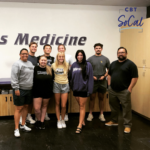What coaches and athletic trainers should know about eating disorders among student athletes


Generally, participation in sport has many benefits such as learning teamwork, discipline, decision-making, and improved physical health. However, student-athletes are still at risk of developing disordered eating habits.
Males and females are at risk:
- A study of NCAA Division 1 athletes found that one-third of female athletes reported symptoms and attitudes indicating they practiced disordered eating and were at risk for an eating disorder.
- Males are also at risk. One-third of males in sports involving an emphasis on diet, weight, or appearance (wrestling, rowing, swimming, diving, etc.) are also affected by disordered eating and at risk for an eating disorder.
What are eating disorders and disordered eating:
- Conditions involving eating and eating behaviors that significantly impair physical health and cause emotional distress.
- Anorexia Nervosa is characterized by persistent caloric intake restriction, fear of gaining weight, and disturbance in perceived weight or image.
- Bulimia Nervosa is characterized by recurrent binging, purging (i.e. vomiting or excessive exercise), evaluating self-worth based on weight and body image.
- Binge eating disorder is characterized by recurrent binge (without compensatory behavior) that results in significant emotional distress.
- Disordered eating is the full spectrum of unhealthy eating that causes significant emotional distress but does not meet diagnostic criteria for an eating disorder.
Health and Performance Consequences include:
- Electrolyte imbalances, irregular heartbeat, and heart failure.
- Premature osteoporosis
- Peptic ulcers, pancreatitis, and gastric rupture
- Increased risk of muscle strains, sprains, and fractures
- Negative effects on VO2 max and running speed
- Dehydration, fatigue, difficulty concentrating and impaired ability to manage emotions
Warning Signs:
- Intense fear of gaining weight and negative or distorted self-image
- Fear of eating in public or frequent excuses for not eating
- Rigid behaviors and routines leading to extreme anxiety if they are interrupted
- Irritability, mood swings, or lack of emotions
- Wearing baggy or layered clothing
- Perfectionism and training more than recommended by coach
What coaches and trainers can do:
- De-emphasize weight and emphasize nutrition’s role in not only staying injury free but also maintaining general health.
- Emphasize that body composition for optimal health and performance will look different for each individual student-athlete.
- Screen student-athletes for eating attitudes and risk factors before the beginning of the season.
- If you are concerned about a student-athlete, approach them in private. Use “I” statements and cite evidence your concerns about their performance and or impact on the team, while also emphasizing your concern about their health and general well-being.
- Do not immediately recommend your student-athlete ends their participation in athletic. Participation in sports can provide many protective factors such as a sense of identity and belonging. Consult with mental health and medical professionals.
- Refer your student-athlete to the college’s Health Center for a check-up and or a session with a registered dietician (if resources are available).
- Refer your student-athlete to seek treatment at the college’s Counseling Center (if resources are available).
Schedule a phone consultation with Dr. von Stietz to learn more about student-athlete mental health issues such as eating disorders.
Sources: 1

Dr. Jason von Stietz specializes in Cognitive Behavior Therapy and Sport/Performance Psychology in Torrance, CA. He works in the Torrance office and is available for a free initial phone consultation. Dr. von Stietz works with individuals from Long Beach, the greater Los Angeles area, and the South Bay including Palos Verdes, Redondo Beach, Hermosa Beach, Manhattan Beach, and El Segundo.




